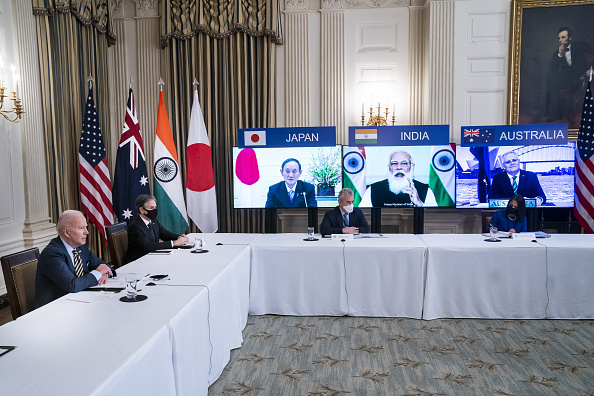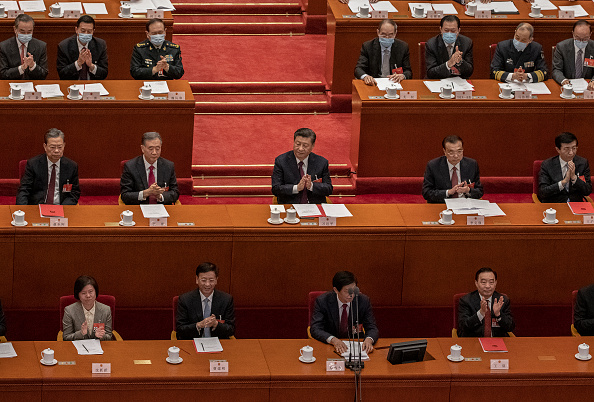
 Bridging the Divide
Bridging the DivideTop officials from China and the United States will meet next week in Alaska, marking the first high-level in-person contact between the U.S. and China under the Biden administration. U.S. Secretary of State Antony Blinken and National Security Adviser Jake Sullivan will meet with Chinese Foreign Minister Wang Yi and Politburo Member Yang Jiechi, in what Blinken called "an important opportunity to lay out in frank terms many concerns the U.S. has with Beijing's actions." Expected areas of cooperation are climate change and the reopening of consulates in Texas and Sichuan.
Prior to the meeting, the Quadrilateral Security Dialogue, also known as the Quad, gathered this Friday for their first-ever meeting since the security forum's re-establishment in 2017. The forum, which is composed of the U.S., Australia, India and Japan, outlined plans to increase production of the coronavirus vaccine in India and addressed strategies for pushing back against China's growing assertiveness in the Asia-Pacific region. When asked about the meeting, Foreign Ministry Spokesperson Zhao Lijian urged the Quad to "refrain from forming closed and exclusive 'cliques'" and "undermining the interests of any third party."
White House Press Secretary Jen Psaki said that the fact that Biden made the meeting "one of his earliest multilateral engagements speaks to the importance we place on close cooperation with our allies and partners in the Indo-Pacific." Read more on the two countries' developing relations in Phone Call Diplomacy from Li Yan, Deputy Director of Institute of American Studies, on China-US Focus.
 Laying the Blueprint
Laying the BlueprintTechnological innovation, economic reform and gender equality were some of the top issues at China's annual Two Sessions meetings. The legislative meetings, which convene both the National People's Congress and China's top advisory body, the Chinese People's Political Consultative Conference, concluded this week. On Thursday the 3,000-person congress approved an ambitious blueprint to strengthen artificial intelligence, quantum computing, and space exploration, among others.
The meeting also ratified the country's 14th five-year plan, outlining goals for the 2021-2025 timeline. Part of the plan includes an annual 7% increase in China's research and development spending. The country's spending on R&D currently stands at 6%, according to Premier Li Keqiang, while developed nations typically spend 15-20%.
Gender issues and mental health were also addressed, including topics on the national marriage age, single home-ownership, and the mental health fallout from the Covid-19 pandemic.
 Space Missions
Space MissionsChina and Russia will join forces to further their countries' respective space programs, signing a memorandum of agreement to collaborate on lunar missions, including the establishment of a research station in orbit or on the surface of the moon. The announcement follows space progress from both China and the United States, with China having recently sent its Chang'e lunar rover on a successful mission, and the United States' martian rover, Perseverance, successfully touching down on Mars in February. For more on the space ambitions of the United States and China, read A Crater on the Moon, a Crater on Earth, by Philip Cunningham, on China-US Focus.
Prepared by China-US Focus editorial teams in Hong Kong and New York, this weekly newsletter offers you snap shots of latest trends and developments emerging from China every week, while adding a dose of historical perspective.
- 2021-03-05 A Tale of Two AI Superpowers
- 2021-02-26 Changing of the Guard
- 2021-02-20 Collective Approaches
- 2021-02-13 Hopes for a Bullish Year
- 2021-02-05 “The Most Serious Competitor”
- 2021-01-29 Looking Towards Multilateralism
- 2021-01-22 Biden’s China Path
- 2021-01-16 Becoming a "Technological Superpower"
- 2021-01-08 Capital Chaos
- 2020-12-18 All Eyes on 2021
- 2020-12-12 Midwest to Middle Kingdom?
- 2020-12-04 Shifting Winds
- 2020-11-21 Multilateralism on the Move
- 2020-11-14 Staying Tough
- 2020-11-07 Battleground Ballots
- 2020-10-30 Knock Knock
- 2020-10-24 Looking Back and Moving Forward
- 2020-10-16 COVID Cluster